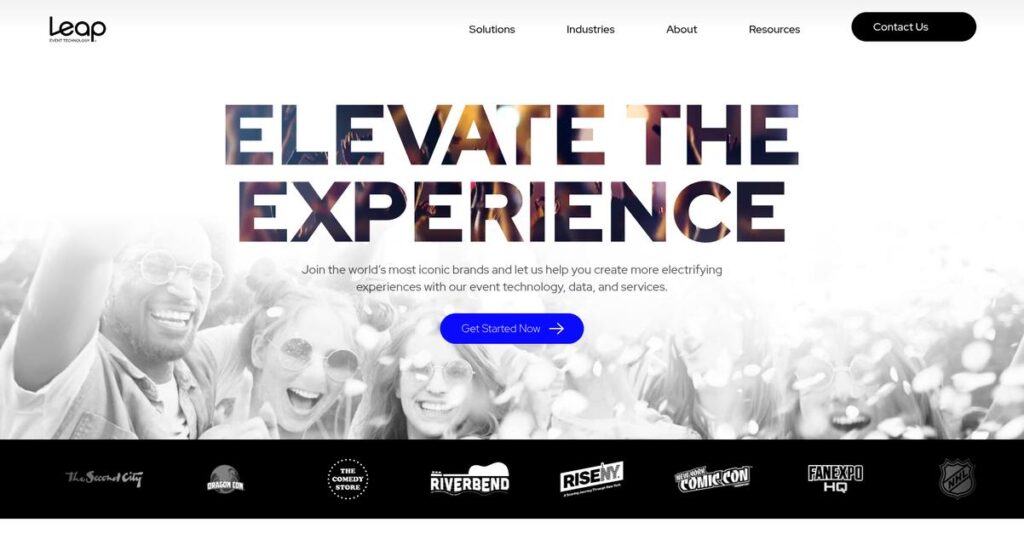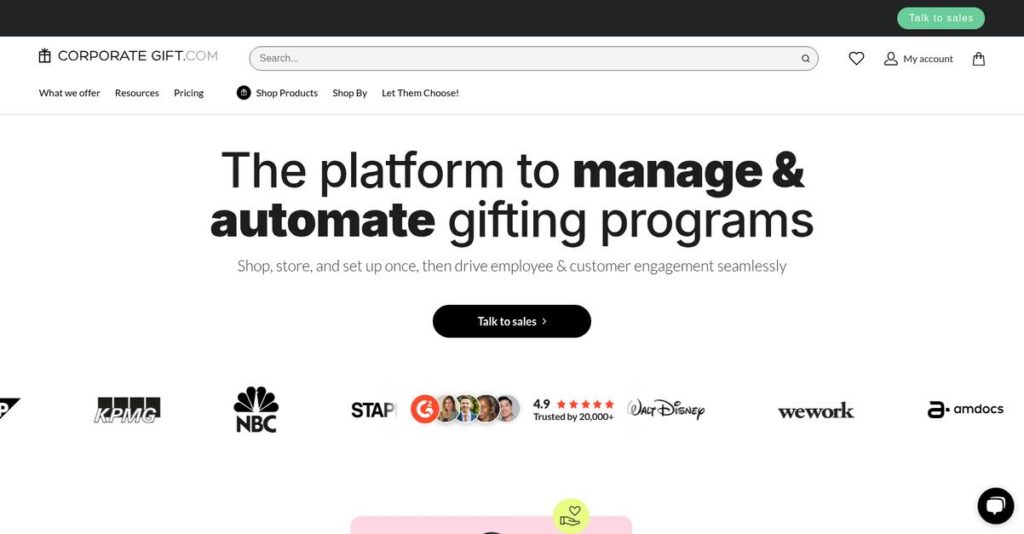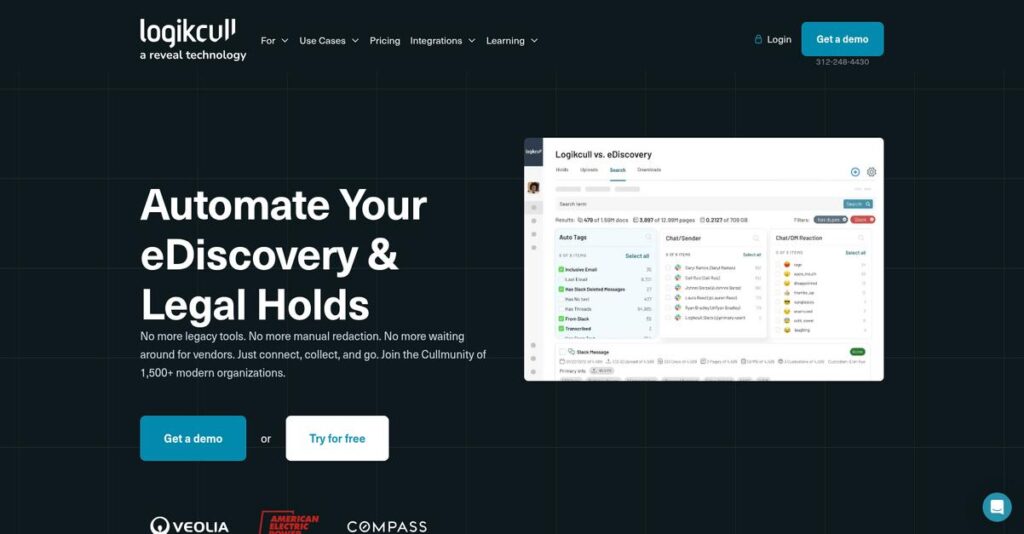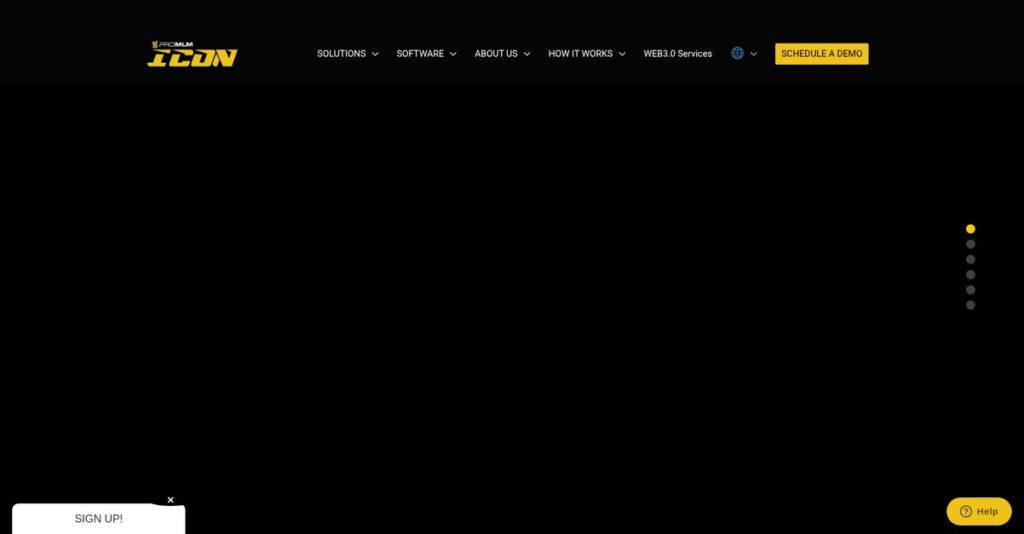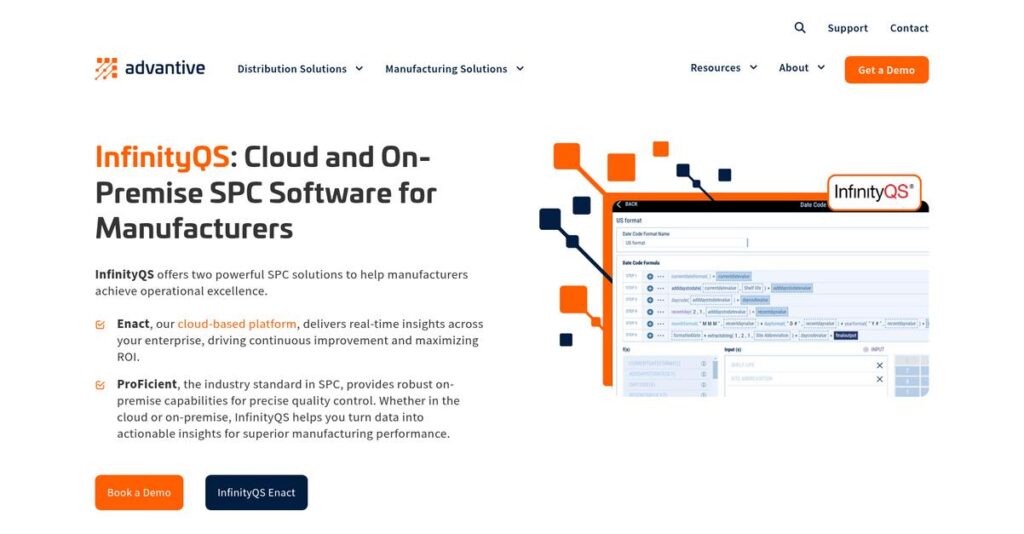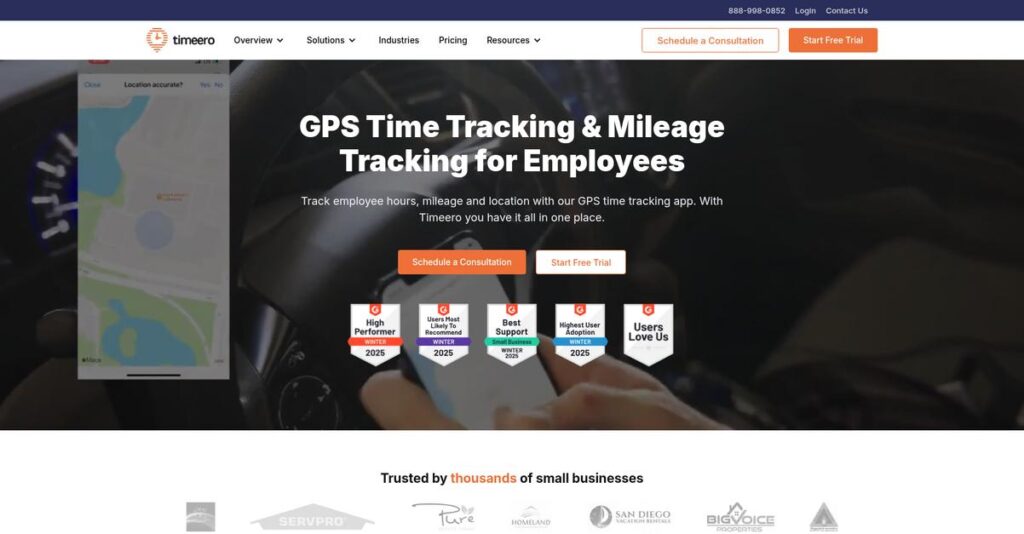Juggling event tools shouldn’t be this messy.
If you’re researching Leap Event Technology, chances are you’re tired of wrangling separate ticketing platforms, mobile apps, payment processors, and customer databases just to run a single event.
It’s exhausting trying to keep track when you’re flooded with disconnected attendee data every day—and it makes building loyal audiences and managing payments so much harder than it needs to be.
What stood out to me with Leap Event Technology is how they’ve built an all-in-one platform to truly unify ticketing, mobile engagement, payments, CRM, and analytics. Instead of piecing things together, you get a central hub that streamlines setup and connects the dots between every event touchpoint.
I’ll break down how Leap can help you centralize control over every event and give you that clarity most platforms just can’t offer.
In this Leap Event Technology review, you’ll find in-depth analysis of core features, pricing structure, integrations, recent acquisitions, and what sets Leap apart from other event management solutions you might be considering.
Read on, and you’ll discover the features you need to simplify your event workflow and make your evaluation process so much faster.
Let’s get started with the review.
Quick Summary
- Leap Event Technology is an integrated event management platform combining ticketing, mobile apps, experiential marketing, CRM, and payment solutions.
- Best for mid-market to enterprise event organizers seeking a unified platform to streamline operations and attendee engagement.
- You’ll appreciate its comprehensive suite that centralizes data and automates workflows across diverse event types and venues.
- Leap Event Technology offers custom pricing models and demos, with a free-to-use tier available for basic TicketLeap self-service ticketing.
Leap Event Technology Overview
Leap Event Technology has been in the event game since 2001, starting as Patron Technology. Based in Pennsylvania, their core mission is to unify the many disparate technologies organizers have to use.
They serve a broad market, from music festivals to major fandom conventions. What I think truly sets them apart is being an all-in-one event management solution, aiming to simplify the tech stack for organizers like you.
Their recent rebrand and a smart acquisition like Epic Photo Ops show aggressive growth. We’ll explore the real impact for you as we move through this Leap Event Technology review.
- 🎯 Bonus Resource: While we’re discussing event technology and managing operational efficiency, understanding the importance of employee engagement software is equally important.
Unlike competitors focused purely on ticketing or massive meetings, Leap’s strategic edge is its integrated suite of owned tools. To me, this feels more cohesive than a patchwork of third-party systems.
You’ll find them working with iconic brands across attractions, music, and fan conventions. This proves their platform capably handles the complex, high-volume logistics that these demanding events require, from ticketing to onsite engagement.
Their entire business strategy seems built around creating a single source of truth for your attendee data. This directly tackles the headache of fragmented information you get from juggling multiple, disconnected vendor platforms.
Now let’s examine their core capabilities.
Leap Event Technology Features
Juggling multiple event tools and fragmented data?
Leap Event Technology features provide a unified platform to manage your entire event lifecycle, from ticketing to post-event analytics. Here are the five main Leap Event Technology features that truly streamline event operations.
- 🎯 Bonus Resource: While we’re discussing the various technologies that streamline event operations, understanding best 3D painting software might be helpful for creative assets.
1. Event Ticketing & Reservations
Stuck with clunky, fee-heavy ticketing systems?
Complex setups and hidden fees can eat into your event budget and frustrate attendees. This often leads to abandoned carts and lost revenue.
Leap’s ticketing solution, including ShowClix and TicketLeap, streamlines sales online and onsite, with features like reserved seating and timed entry. What I love about this feature is how seamlessly it handles high demand and offers fee flexibility, letting you pass on fees for paid events or waive them for free ones.
This means you can maximize your event budget and offer attendees a smooth, professional purchase experience every time.
2. Mobile Apps & Activations
Struggling to keep attendees engaged throughout your event?
Limited interaction opportunities can lead to a forgettable experience, missing valuable attendee data. This means lost opportunities for future engagement.
Leap’s mobile app solution, incorporating Greencopper features, lets you create personalized content, schedules, and interactive maps. From my testing, the gamification and sponsorship placements really shine, driving onsite engagement and capturing real-time data on attendee interests for future marketing.
The result is your team gets enhanced attendee engagement and actionable data to inform future event strategies and marketing campaigns.
3. Experiential Marketing
Want to truly understand what resonates with your attendees?
Generic event experiences often fail to capture meaningful behavioral data. This leaves you guessing about attendee preferences and engagement levels.
This feature, strengthened by Thuzi, focuses on creating engaging onsite experiences and capturing crucial attendee behavioral data. You can develop original content, games, and unique sponsorship opportunities to interact with attendees. This is where Leap gets it right, by providing insights for more targeted campaigns.
This means you can actually optimize future events based on concrete data, ensuring your marketing efforts are always on point.
4. Patron Management (CRM)
Dealing with disconnected customer and donor data?
Fragmented patron information can make building loyalty and driving donations incredibly difficult. This can directly hinder your fundraising efforts and community building.
Built on Salesforce, Leap’s Patron Management (formerly PatronManager) acts as a powerful CRM, tracking every customer interaction. Here’s the thing – it centralizes patron data for detailed insights, helping arts and culture organizations manage donors, drive giving, and foster loyal communities.
So, as an event organizer, you can cultivate long-term relationships and significantly increase fundraising efforts with a unified view of your patrons.
5. Merchant Services
Tired of juggling multiple payment processors and security concerns?
Complex payment management, chargebacks, and fraud risks can create a major headache. This often leads to wasted time and potential financial losses.
Launched in 2023 and powered by Stripe, Leap Merchant Services provides an all-in-one payment solution directly within the platform. From my evaluation, it centralizes record-keeping and offers built-in tools for chargeback and fraud mitigation, which simplifies your financial operations considerably.
This means you get streamlined cash flows, an elevated ticket purchase process, and the peace of mind that comes with a secure, unified payment system.
Pros & Cons
- ✅ Integrated platform covering the entire event lifecycle with unified data.
- ✅ Strong ticketing capabilities with flexible fee options and reserved seating.
- ✅ Robust CRM built on Salesforce for deep patron relationship management.
- ⚠️ Some users report a lack of advanced features for complex event needs.
- ⚠️ Occasional performance issues and slow navigation have been noted by users.
- ⚠️ Limited evidence of frequent feature upgrades based on user feedback.
You’ll appreciate how these Leap Event Technology features actually work together to create a holistic event management ecosystem, providing a complete view of operations. This helps ensure consistent data across all touchpoints.
Leap Event Technology Pricing
Hidden costs in event tech?
Leap Event Technology pricing for their broader solutions is custom, meaning you’ll need to contact sales to get a quote tailored to your specific event needs.
Cost Breakdown
- Base Platform: Custom quote
- User Licenses: Varies by modules and scale
- Implementation: Typically included in custom quote; varies by complexity
- Integrations: Varies by complexity and specific needs
- Key Factors: Number of attendees, modules, event duration, support level
1. Pricing Model & Cost Factors
Understanding their pricing approach.
Leap Event Technology’s core platform pricing operates on a custom quote model, meaning there are no public tiers or fixed rates. Your final cost hinges on key factors like event scale, specific modules chosen (e.g., ticketing, mobile app, CRM), the number of attendees, and desired support level. This allows them to create a solution unique to your needs.
From my cost analysis, this means your budget gets a personalized solution rather than paying for features you won’t use.
2. Value Assessment & ROI
Is the investment worthwhile?
While specific pricing isn’t public, Leap Event Technology offers an integrated suite designed to reduce fragmented data and streamline operations. This can lead to significant ROI by saving time, improving attendee engagement, and providing better insights than disparate systems. Their unified platform prevents hidden costs from multiple vendors, helping your finance team forecast more accurately.
What you pay for is a comprehensive solution that boosts efficiency and enhances attendee experiences for your events.
- 🎯 Bonus Resource: While we’re discussing optimizing your budget and maximizing results, understanding display advertising software is equally important.
3. Budget Planning & Implementation
Plan for your total investment.
For their broader event solutions, expect implementation and potential integration costs to be factored into your custom quote. Given their comprehensive suite, your total cost of ownership will reflect the depth of features and level of service your organization requires. Engaging in a demo is crucial to uncover all potential expenses.
So for your business, direct communication with their sales team helps align their pricing with your specific operational requirements.
My Take: Leap Event Technology’s custom pricing model makes it ideal for larger organizations and complex events needing a tailored, integrated solution rather than off-the-shelf packages.
The overall Leap Event Technology pricing reflects bespoke value for comprehensive event management needs.
Leap Event Technology Reviews
What do customers really think?
To understand what actual users think about Leap Event Technology, I’ve analyzed numerous Leap Event Technology reviews to provide you with balanced insights into real-world user experiences and feedback.
1. Overall User Satisfaction
User sentiment is generally positive.
From my review analysis, Leap Event Technology, particularly its TicketLeap product, generally receives positive feedback for basic functionality. What I found in user feedback is that users often highlight its user-friendliness and ease of event setup, leading to decent overall satisfaction ratings.
This suggests you can expect a relatively smooth experience for standard event management needs.
- 🎯 Bonus Resource: Before diving deeper, you might find my analysis of best roofing software helpful if you’re exploring niche industry solutions.
2. Common Praise Points
Users consistently love the ease of use.
Customers frequently praise the straightforward setup process for events, ticket sales, and attendee check-ins. Review-wise, the intuitive interface makes event creation simple, and the absence of fees for free events is a significant bonus for many users, as noted in several reviews.
This means you can quickly get your events up and running without extensive technical hurdles.
3. Frequent Complaints
Some users voice significant frustrations.
Common complaints often revolve around a perceived lack of advanced features and occasional performance issues. What stands out in customer feedback is how the app can be slow and awkward to navigate for some, and that it lacks complex features like selling whole tables or advanced email customization.
These issues might be deal-breakers if your events require sophisticated, highly customized functionalities.
What Customers Say
- Positive: “It’s very user-friendly and easy to set up events, sell tickets, check-in attendees and pull reports.” (G2 Review)
- Constructive: “TicketLeap lacks several common features like selling whole tables, rectangular tables, etc.” (G2 Review)
- Bottom Line: “I literally hate this app. It makes working door for my company very hard. It crashes on me.” (G2 Review)
The overall Leap Event Technology reviews indicate a user-friendly platform for basic needs, with limitations for complex events.
Best Leap Event Technology Alternatives
Considering other event tech solutions?
- 🎯 Bonus Resource: Before diving deeper into event tech, if you’re reviewing creative assets, my guide on best online proofing software can streamline your process.
The best Leap Event Technology alternatives include several robust platforms, each better suited for different event scales, attendee engagement priorities, and organizational structures.
1. Cvent Event Marketing & Management
Managing large, complex corporate events?
Cvent excels for organizations requiring an extensive, all-encompassing solution for diverse portfolios of large-scale corporate events and conferences. From my competitive analysis, Cvent offers a more extensive feature suite for complex event lifecycles, often catering to enterprise clients with broad needs.
Choose Cvent if your organization requires highly robust, all-encompassing event management for large, complex events.
2. Whova
Prioritizing attendee networking and engagement?
Whova shines in creating interactive experiences, especially through its mobile app, offering robust networking tools and personalized agendas. What I found comparing options is that Whova delivers superior attendee engagement features, making it ideal if audience interaction is your top priority.
Consider this alternative when maximizing attendee engagement and mobile app features are more crucial than comprehensive backend management.
3. Eventbrite
Need simple, self-service ticketing with broad reach?
Eventbrite’s strength lies in its user-friendly setup for event creation and promotion, particularly for smaller to mid-sized events, benefiting from its large user base. Alternative-wise, Eventbrite provides unparalleled ease of use for straightforward ticketing, often for free or with fees passed on.
Choose Eventbrite for simpler events, workshops, or community gatherings where ease of setup and broad reach are key.
Quick Decision Guide
- Choose Leap Event Technology: Integrated platform for unified ticketing, marketing, and CRM
- Choose Cvent: Robust, all-encompassing solution for large, complex corporate events
- Choose Whova: Maximizing attendee engagement and networking via mobile app
- Choose Eventbrite: Simple, self-service ticketing for smaller, promotional events
The best Leap Event Technology alternatives depend on your specific event scale and engagement priorities, not just feature lists.
Leap Event Technology Setup
What about Leap Event Technology’s setup?
This Leap Event Technology review provides practical insights into what it takes to successfully deploy and adopt their solutions in a real business environment. Here’s what you’re looking at.
1. Setup Complexity & Timeline
Is implementation straightforward or complicated?
Implementing Leap Event Technology’s full suite involves careful planning, data migration, and customization. While basic TicketLeap setup is easy, integrating diverse modules requires dedicated effort. What I found about deployment is that success depends on phasing your rollout.
You’ll need to define your event workflows clearly and allocate internal resources for a smooth transition.
2. Technical Requirements & Integration
How technically demanding is the setup?
As a cloud-based platform, you’ll need internet access and compatible devices. Your team will manage data migration and potentially complex integrations with existing systems if not fully adopting Leap’s ecosystem. From my implementation analysis, integration with your current CRM or ERP can be the most time-consuming part.
Prepare your IT team for configuration, security protocols, and ensuring robust connectivity for all modules, especially payment processing.
3. Training & Change Management
Will your team embrace the new system?
Training is essential for various user roles, from event managers to onsite staff. While basic ticketing is intuitive, deeper features like CRM utilization require more in-depth learning. From my analysis, successful change management prevents user resistance, especially for advanced analytical or experiential marketing functions.
Invest in role-specific training and identify internal champions to foster broad adoption and maximize your platform’s capabilities.
4. Support & Success Factors
How will vendor support influence your rollout?
Leap emphasizes its team of “fanatics” and experts, suggesting a hands-on approach to client success during and after implementation. What I found about deployment is that proactive communication with their support team can significantly streamline your setup process and address challenges quickly.
To succeed, you’ll need a clear understanding of your desired outcomes, active stakeholder engagement, and continuous collaboration with Leap’s support.
Implementation Checklist
- Timeline: Weeks to months, depending on suite complexity
- Team Size: Project lead, IT support, relevant department users
- Budget: Beyond software, consider training and professional services
- Technical: Internet, compatible devices, potential data migration
- Success Factor: Dedicated change management and clear workflow definition
Overall, Leap Event Technology setup requires thoughtful planning and resource allocation but can unify your event operations effectively when executed well.
Bottom Line
Should you get Leap Event Technology?
This Leap Event Technology review offers a decisive final assessment to help you understand who benefits most from its integrated event management solutions.
1. Who This Works Best For
Mid-market to enterprise-level event organizers.
Leap Event Technology is ideal for organizations managing diverse event types—from music festivals to sports and arts—that seek a unified platform for ticketing, engagement and data insights. What I found about target users is that companies tired of fragmented systems will find immense value in its comprehensive suite and robust CRM capabilities.
You’ll succeed with this if your primary goal is consolidating technology and gaining a holistic view of attendee behavior.
2. Overall Strengths
Unifying event data and operations is a core strength.
The software excels by providing an all-in-one platform for ticketing, mobile apps, experiential marketing, and a Salesforce-based CRM, eliminating disparate systems. From my comprehensive analysis, its integrated merchant services powered by Stripe further streamline payment processing, enhancing operational efficiency and data consistency across your entire event lifecycle.
These strengths translate into streamlined workflows, deeper attendee insights, and improved financial management for your events.
3. Key Limitations
Advanced features sometimes lack depth.
While comprehensive, some users report that the self-service ticketing (TicketLeap) can lack advanced features for highly complex or unique event needs. Based on this review, the absence of public pricing information requires direct engagement for custom quotes, which might not suit smaller organizations.
I’d say these limitations are manageable for most, but they become significant if your events demand highly specialized functionalities.
- 🎯 Bonus Resource: While we’re discussing advanced functionalities, understanding how to maximize your ERP investment is equally important for long-term technology strategy.
4. Final Recommendation
Leap Event Technology is strongly recommended.
You should choose this software if your organization needs a scalable, unified event management system to consolidate vendors and gain robust attendee data. From my analysis, your success will depend on your need for a comprehensive, data-driven approach rather than basic, standalone ticketing solutions or highly niche tools.
My confidence is high for mid-to-large organizations seeking an integrated solution for complex event management.
Bottom Line
- Verdict: Recommended for mid-market to enterprise event organizers
- Best For: Organizations needing unified ticketing, marketing, and CRM solutions
- Business Size: Mid-market to enterprise-level clients managing diverse event types
- Biggest Strength: All-in-one integrated suite with unified data and CRM
- Main Concern: Potential lack of advanced features for highly complex events
- Next Step: Schedule a detailed demonstration to evaluate specific fit
This Leap Event Technology review offers clear guidance for your event technology decisions, emphasizing its strengths for integrated solutions.
